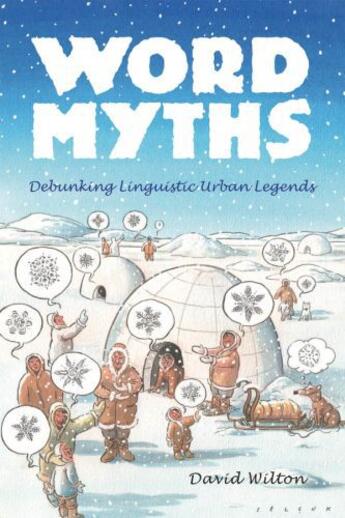Des idées de lecture pour ce début d'année !
Passionné(e) de lecture ? Inscrivez-vous
gratuitement ou connectez-vous pour rejoindre la
communauté et bénéficier de toutes les fonctionnalités du site !

Do you believe that Ring Around the Rosie refers to the Black Death? Or that Eskimos have 50 (or 500) words for "snow"? Or that "Posh" is an acronym for "Port Out, Starboard Home"? If so, you badly need this book. In Word Myths, David Wilton debunks some of the most spectacularly wrong word histories in common usage, giving us the real stories behind many linguistic urban legends.
Readers will discover the true history behind such popular words and expressions such as "rule of thumb," "the whole nine yards," "hot dog," "raining cats and dogs," "chew the fat," "AWOL," "under the weather," "in like Flynn," "Dixie," "son of a gun," "tinker's damn," and many more. We learn that SOS was not originally an acronym for "Save Our Ship" or "Save Our Souls," but was chosen because the morse code signal (3 dots, 3 dashes, 3 dots) was easy to send and recognize. Also, "let the cat out of the bag" does not refer to the whip (the "cat") used to punish sailors aboard ship. The term "upset" (to defeat unexpectedly) does not date from the horse race when the heavily favored Man O' War was beaten by a nag named Upset (Upset was the only horse ever to defeat Man O' War, but the word predates the race by half a century). And Thomas Crapper did not invent the flush toilet, nor do the words "crap" or "crapper" derive from his name.
As Wilton quashes these word myths, he offers us the best of both worlds: not only do we learn the many wrong stories behind these words, we also learn why and how they were created--and what the real story is. "Think 'hot dog' was coined by a New York baseball vendor, or that a certain vulgarity originated as an acronym? Then you need to read this book, which shows that some of the best etymological stories are just tall tales." --Chicago Tribune (10 Best Books About Language, 2004) "Most everything you know about word and phrase origins is likely to be wrong, and David Wilton proves it with a light touch and a wealth of fascinating case histories. Absolutely everyone with an interest in language will love this book." --J.E. Lighter, Editor, Historical Dictionary of American Slang
Il n'y a pas encore de discussion sur ce livre
Soyez le premier à en lancer une !

Des idées de lecture pour ce début d'année !

Si certaines sont impressionnantes et effrayantes, d'autres sont drôles et rassurantes !

A gagner : la BD jeunesse adaptée du classique de Mary Shelley !

Caraïbes, 1492. "Ce sont ceux qui ont posé le pied sur ces terres qui ont amené la barbarie, la torture, la cruauté, la destruction des lieux, la mort..."